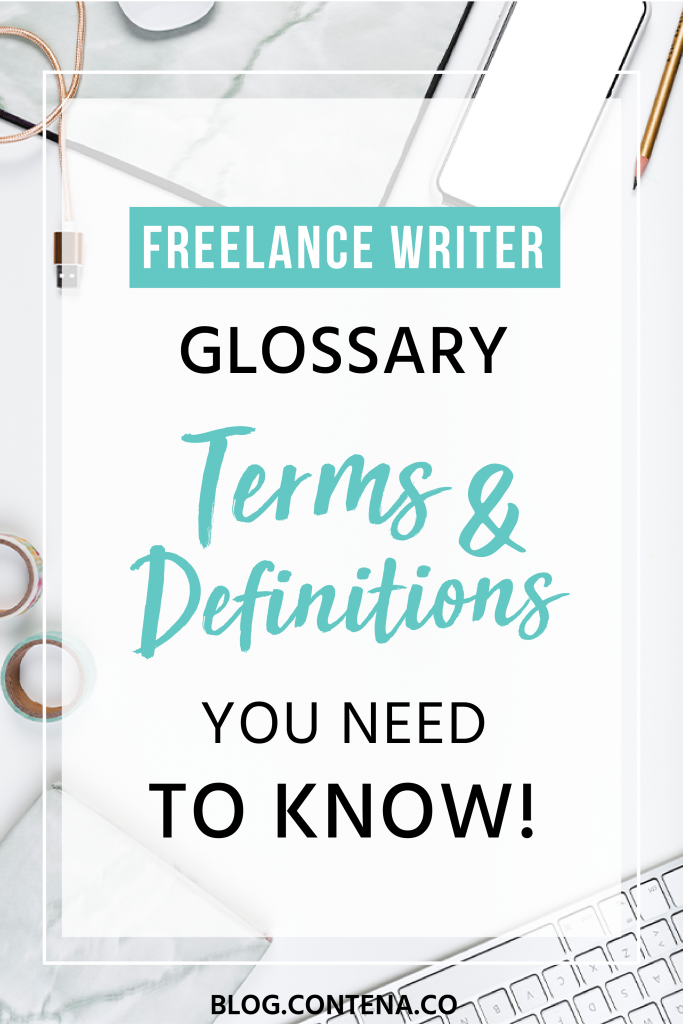Learning the ropes of the freelance industry can be daunting, especially when it comes to the jargon. I’ve been freelance writing for years now and I still need to look up the occasional definition.
I’ve gathered some of the basic buzzwords you will likely find in your writing journey so that you’ll be prepared when you hear them.
Copy
This is another word for what you write. If you write words for a client, you write copy.
Content writing vs. copywriting
This is a big one. It’s one that even seasons writers have trouble with sometimes.
Both require skill, but is there really a difference between content writing and copywriting? Some say yes, and some say no. What matters is understanding what your client wants.
Content writing is anything written without the express purpose of advertising or selling a product. It tends to be more educational. If you have a blog, it’s probably considered content writing.
Copywriting is typically found in marketing campaigns and is designed to sell something. A marketing email, for instance, is something someone has copywritten.
Again, these are not concrete definitions. In fact, your client may call their writing something entirely different. That’s why it is crucial to communicate thoroughly with your client.
Knowing exactly what they want is half the battle.
Bio
This is a short piece about you. This is something you write about yourself in the third person. It looks something like this:
“John lives and works in Maine. He writes legal briefs and blogs about his daily life as a lawyer. You can check out his website at xyz.abc.”
This is where you want to brag about yourself concisely.
Byline
A byline is exactly what it sounds like: by line. It means you get your name published along with your written work. It’s how writers get exposure and build a portfolio.
Portfolio or Clips
When applying for a job, a potential client may ask you for clips or a link to your portfolio. Whether your only published pieces are from your own blog, or from another client, they are asking for links to your writing.
Pitch
One of the very first words I learned (or tried to learn) as a freelancer was “pitch”.
A potential client or publication might request a pitch from you. Follow their guidelines and choose your best idea (or three). Tell them about that idea in a brief outline.
For example, if you have an idea for an article on gardening, an outline might look like this.
- Intro
- Reason one that gardening is better than meditation
- Reason two
- Scientific proof
- Conclusion
They may require a more detailed version of your idea. They might even request that you write the first paragraph and send that to them.
Every pitch will be different. The most important thing to remember is to follow instructions.
Deadline
Deadline is your due date. Typically your client will give you a deadline. If you want to keep your clients, then you should never miss a deadline.
In fact, when a client gives me a deadline for an article, I set a self-imposed deadline that is actually one or two days before the client’s deadline.
This allows for some padding in case of emergencies or illness. It also gives your client more time to look over your work and request necessary changes.
Types of editing
As a writer, you may dabble in some editing on your own. Or, perhaps you want an editor to look over your work before you send it to potential buyers or clients.
- Substantive editing, also called developmental editing, is looking at a piece of writing as a whole. Substantive editors check for coherence, flow, structural issues, and organization. It is the most thorough form of editing.
- Copy editing is where an editor will correct grammar, spelling, punctuation, slang, and style.
- Proofreading is exactly what it sounds like. Proofreading editors will check for minor errors like verb tenses, capitalization, and proper word usage.
Ghostwriting
Ghostwriting is the opposite of having a byline. You are writing something for someone else.
They will get the credit, and you cannot claim the work as your own, not even to potential clients down the road. You will likely have to sign a contract agreeing to this if you decide to ghostwrite for a client.
Many freelancers make their entire living being ghostwriters.
White paper writing
White paper writing is a technical form of writing. It is an expert research document. Some writers write white papers exclusively.
WordPress
WordPress is simply a way to manage content on your blog, or your client’s blog.
Nearly everyone who runs a website uses WordPress to manage their material. It can be set up so that it is as simple as dragging and dropping info, or it can be as complex as coding an entire website.
Let’s say a client has hired you to write an article and instructed you to load it into WordPress when you’re done. What will typically happen is the client will give you the website address to use, and a username and password to log in.
Once you log in, you’ll be able to see where to upload your work. It looks kind of like writing an email.
Of course, this is a very simplified version of what WordPress is and does. There’s tons of info out there for beginners and experts alike.
SEO
Search Engine Optimization, or SEO, is crucial to know if you are a content writer. It’s a way to get certain keywords into an article.
For example, if you google “How to organize my garage,” someone, somewhere, has written that phrase into an article. Based on your optimized search, you will see that article when you use those keywords.
Some clients only want you to write in a way that gets traffic to their website. SEO trends are constantly changing.
If you want to write SEO-based pieces, you’ll need to make sure you are aware of the ever-changing patterns.
Lede
“You really buried the lede on that one!”
Ever heard that phrase before? A lede is the most important part of a story. It’s typically used in journalism, and it is usually the opening sentence or paragraph.
Basically, you never want to bury the lede!
On Spec
Have you ever heard another writer say they’ve written something “on spec?”
Some clients may request that you write something on spec. This means they want to see an entire finished article before agreeing to hire you or pay you for your work.
You can also write something on spec on your own, and seek out publishers. You may find clients that are interested in a completed article.
Is this a good practice or a bad practice?
It’s hard to say. If you are a well-known writer, you can probably get away with writing pieces on spec. New writers, however, probably won’t be as lucky.
But if you have a great idea and an excellent article, don’t listen to me! Get it out there! You never know if you never try, right?
Verticals
This is a trendy new word that has increased in popularity as of late.
The word vertical just means topic. A website might have lots of verticals (or topics) all inside one domain.
Let’s say they have entertainment info, politics, world news, and health all inside their one website. Each of those topics is considered a vertical.
Listicle
If you are ever hired to write a listicle, you are being asked to present information in a list form. For example, “These 5 tips will…”
- Tip one
- Tip two
- Tip three
- Tip four
- Tip five
Everyone has seen those lists!
Anchor text
If a client is asking you to make something “anchor text,” they are referring to the clickable words that make a hyperlink.
This is the anchor text for an article about plagiarism.

Scope creep
Once you’ve got a few clients, you might experience scope creep. Let’s say a client has hired you to write an article for their blog.
They may email you and ask you to also include images. And then maybe they tell you that you need to reach out to other companies and request publishing from them.
And on and on.
Your original scope was writing one article.
When scope creep comes along, they are asking you to do more work than initially contracted, for the same amount of pay.
Any freelancer will tell you to nip scope creep in the bud the very first time it happens.
Evergreen
Sometimes potential clients will recommend that your article be evergreen.
Just like the tree, it means your writing should be good year-round. If someone reads your piece, it should contain no dates or references to a certain time of year.
This ensures that they can use this piece always, for a long time to come.
Like anything else, you’ll get the hang of all these definitions the more you immerse yourself in the freelance writing world.










